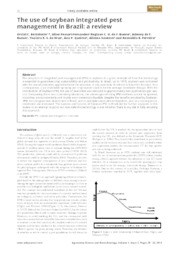The use of soybean integrated pest management in Brazil: a review.
The use of soybean integrated pest management in Brazil: a review.
Author(s): BORTOLOTTO, O. C.; POMARI-FERNANDES, A.; BUENO, R. C. O. de F.; BUENO, A. de F.; KRUZ, Y. K. S. da; QUEIROZ, A. P.; SANZOVO, A.; FERREIRA, R. B.
Summary: The adoption of integrated pest management (IPM) in soybean is a great example of how this technology is essential to guarantee crop sustainability and productivity. In Brazil, up to 1970, soybean was cultivated with the use of pesticides applied without the adoption of any economic threshold to base this decision. As a consequence, a six-insecticide spraying per crop season used to be the average insecticide dosage. With the introduction of Soybean-IPM, the use of pesticides was reduced to approximately two applications per season. Comparing these two contrasting situations, the advantages of using IPM methods cannot be ignored, since they are economically and mostly environmentally feasible. Despite the benefits provided by Soybean-IPM, this program was abandoned in Brazil, and its principles were almost forgotten, and, as a consequence, insecticide use increased. The success and failures of Soybean-IPM in Brazil will be further analyzed in this review in an attempt to point out how safe this technology is and whether there is any risk in fully adopting this approach.
Publication year: 2015
Types of publication: Journal article
Unit: Embrapa Soybean
Keywords: Controle integrado, Integrated pest management, Soja, Soybeans
Observation
Some of Embrapa's publications are published as ePub files. To read them, use or download one of the following free software options to your computer or mobile device. Android: Google Play Books; IOS: iBooks; Windows and Linux: Calibre.
Access other publications
Access the Agricultural Research Database (BDPA) to consult Embrapa's full library collection and records.
Visit Embrapa Bookstore to purchase books and other publications sold by Embrapa.

